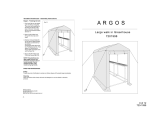TEST RUNNING
19
ENGLISH
1 Precautions In Test Running
- The initial power supply must provide at least 90% of the rated voltage.
Otherwise, the air conditioner should not be operated.
CHECK THE FOLLOWING ITEMS WHEN INSTALLATION IS COMPLETE
- After completing work, be sure to measure and record trial run properties, and store measured
data, etc.
- Measuring items are room temperature, outside temperature, suction temperature, blow out
temperature, wind velocity, wind volume, voltage, current, presence of abnormal vibration and
noise, operating pressure, piping temperature, compressive pressure.
- As to the structure and appearance, check following items.
- The test run is started by pressing the room temperature checking button and down timer
button for 3 seconds at the same time.
- To cancel the test run, press any button.
CAUTION
• For test run, carry out the cooling operation firstly even during heating season. If heating oper-
ation is carried out firstly, it leads to the trouble of compressor. Then attention must be paid.
• Carry out the test run more than 5 minutes without fail.
(Test run will be cancelled 18 minutes later automatically)
!
□Is the circulation of air adequate?
□Is the draining smooth?
□Is the heat insulation complete
(refrigerant and drain piping)?
□Is there any leakage of refrigerant?
□Is the remote controller switch operated?
□Is there any faulty wiring?
□Are not terminal screws loosened?
M4......118N.cm{12kgf.cm}
M5......196N.cm{20kgf.cm}
M6......245N.cm{25kgf.cm}
M8......588N.cm{60kgf.cm}
2 Connection of power supply
- Connect the power supply cord to the independent power supply.
Circuit breaker is required.
- Operate the unit for fifteen minutes or more.
3 Evaluation of the performance
- Measure the temperature of the intake and discharge air.
- Ensure the difference between the intake temperature
and the discharge one is more than 8°C (Cooling) or
reversely (Heating).




















